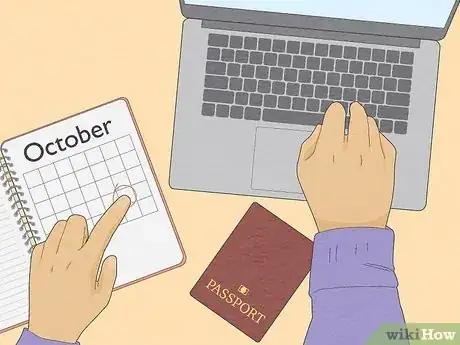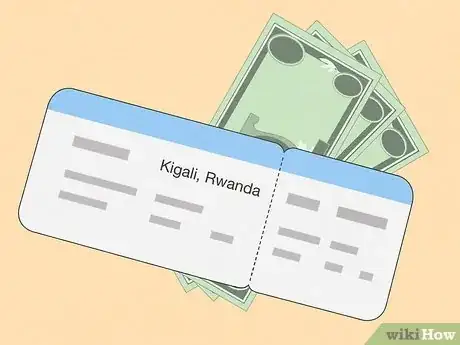This article was co-authored by Stef Katz and by wikiHow staff writer, Jessica Gibson. Stef Katz is a Travel Agent and the Founder of The Travel Superhero. She has helped clients enjoy convenience, access, personal attention, and ease in their travel planning for 6 years. Stef specializes in elevated social travel and finds ways to bring peace of mind to her travelers with open communication, genuine care, and professional support. She holds an Associate's Degree in Liberal Arts from Miami Dade College and a Bachelor's Degree in Marketing from the University of Florida, as well as numerous certifications with destinations, tour companies, and cruise lines in the travel industry.
There are 15 references cited in this article, which can be found at the bottom of the page.
This article has been viewed 19,950 times.
Vacationing in Africa has a reputation for being expensive, but it doesn't have to be! It's totally possible to book an affordable flight. From there, you can save on lodging and meals, especially if you're not afraid to backpack or eat local cuisine. We'll give you some tricks and travel hacks so you can enjoy Africa even on a tight budget.
Steps
Expert Q&A
-
QuestionHow do I not pack too much?
 Archana Ramamoorthy, MSArchana Ramamoorthy is the Chief Technology Officer, North America at Workday She is a product ninja, security advocate, and on a quest to enable more inclusion in the tech industry. Archana received her BS from SRM University and MS from Duke University and has been working in product management for over 8 years.
Archana Ramamoorthy, MSArchana Ramamoorthy is the Chief Technology Officer, North America at Workday She is a product ninja, security advocate, and on a quest to enable more inclusion in the tech industry. Archana received her BS from SRM University and MS from Duke University and has been working in product management for over 8 years.
Chief Technology Officer, Workday A lot of people overpack clothes, but you must really think things through. For instance, you probably only need one pair of shoes for a trip, so try to find a pair that can go well with most of your clothes and that will be comfortable. Remember that there's usually laundry facilities available in most places, so you don't really need to pack a lot of clothes.
A lot of people overpack clothes, but you must really think things through. For instance, you probably only need one pair of shoes for a trip, so try to find a pair that can go well with most of your clothes and that will be comfortable. Remember that there's usually laundry facilities available in most places, so you don't really need to pack a lot of clothes. -
QuestionDoes rolling clothes save space?
 Archana Ramamoorthy, MSArchana Ramamoorthy is the Chief Technology Officer, North America at Workday She is a product ninja, security advocate, and on a quest to enable more inclusion in the tech industry. Archana received her BS from SRM University and MS from Duke University and has been working in product management for over 8 years.
Archana Ramamoorthy, MSArchana Ramamoorthy is the Chief Technology Officer, North America at Workday She is a product ninja, security advocate, and on a quest to enable more inclusion in the tech industry. Archana received her BS from SRM University and MS from Duke University and has been working in product management for over 8 years.
Chief Technology Officer, Workday Yes, it does! My personal tip is to fold and roll your clothes, then put them on plastic bags. Close the bags three-fourths of the way, pump the air out and close the rest. This way, you'll avoid wrinkles and will free up space in your luggage.
Yes, it does! My personal tip is to fold and roll your clothes, then put them on plastic bags. Close the bags three-fourths of the way, pump the air out and close the rest. This way, you'll avoid wrinkles and will free up space in your luggage.
Warnings
- If traveling by yourself, make sure to activate the location services on your cell phone and share it with someone you trust, like a partner or a close family member.⧼thumbs_response⧽
References
- ↑ https://ntabaafrica.com/east-africa-safari-off-season/
- ↑ https://travelnoire.com/10-cheap-tourist-destination-africa
- ↑ https://www.expatarrivals.com/africa/kenya/transport-and-driving-kenya
- ↑ https://www.lonelyplanet.com/africa/narratives/practical-information/transport/getting-around/train
- ↑ https://www.theguardian.com/travel/2016/jan/20/top-10-backpacker-lodges-south-africa-eastern-cape
- ↑ https://www.volunteerforever.com/article_post/cheap-affordable-volunteer-abroad-programs-low-cost-overseas-projects/
- ↑ https://www.nationalgeographic.com/traveler/extras/planner/africa/budget.html
- ↑ https://wwwnc.cdc.gov/travel/destinations/traveler/none/south-africa
- ↑ https://umabroad.umn.edu/resources/travel/electronics
- ↑ http://hipafrica.com/features/the-art-of-haggling/
- ↑ https://www.travelandleisure.com/trip-ideas/safaris/ten-amazing-affordable-safaris
- ↑ https://national-parks.org/africa
- ↑ https://www.victoriafalls-guide.net/victoria-falls-entrance.html
- ↑ https://www.fodors.com/news/trip-ideas/how-to-fly-business-class-to-africa-for-the-price-of-an-economy-ticket
- ↑ https://www.worldnomads.com/travel-safety/africa/tanzania/dealing-with-touts-in-tanzania































































